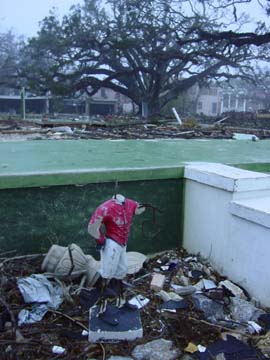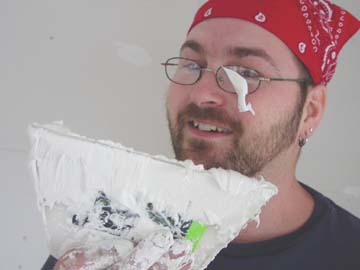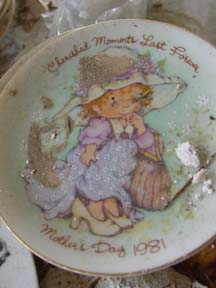|
Hope Admist the Ruins of Hurricane Katrina
January 30, 2006—The morning was quite surreal. I drove in to Biloxi,
Mississippi this morning at 7:30 a.m. in a dense fog. As I reached the main
drive along the Gulf—highway 90—bits of trash dotted the live oaks and the
occasional ruined mansion seems to rise through the mist.
 I stop the car and walk up to one slab. The only thing remaining from what must
have been an impressive home is a decapitated jockey statue near the front
steps, which now lead to no where. I drive for a couple of miles and see only
ruins. I wonder what I’m seeing. I wonder aloud whether this slab was a house,
or those ruins were a motel, or maybe a condo. Sometimes it’s fairly easy to
tell what might have been. Mostly not. I stop the car and walk up to one slab. The only thing remaining from what must
have been an impressive home is a decapitated jockey statue near the front
steps, which now lead to no where. I drive for a couple of miles and see only
ruins. I wonder what I’m seeing. I wonder aloud whether this slab was a house,
or those ruins were a motel, or maybe a condo. Sometimes it’s fairly easy to
tell what might have been. Mostly not.
Following the directions I printed off a website, I make the proper turns and
soon find myself at the Lutheran Church of the Good Shepherd. I park and walk
up to a tool shed where various items are being checked out. “Where do I check
in?” I ask a man whose Lutheran Episcopal Disaster Response nametag tells me is
Keith.
Keith asks what I can do and before I can hem or haw, he asks “Have you mudded
sheetrock before?” I allow that I have and try to add that I’m not too good at
it. But he is already saying that the fact that I have mudded sheetrock before
this morning makes me “an experienced worker.” I am given an inexperienced
co-worker, Robert from LaCrosse, Wisconsin, and before long we are joined by
eight more Lutherans, these down from South Dakota. As you read this column,
pause now and you can probably hear someone in Camden County laughing loudly at
the idea that I am now an expert on mudding sheetrock.
 With the Gulf Coast still enshrouded in fog, we drive to the worksite, with
Keith leading the caravan, leaving once we have found our worksite. By 9 a.m.,
I’m mudding sheetrock joints in the home of a Biloxi Policeman. His house was
hit by a six foot tidal surge that ripped out the brick walls and sheetrock and
left the roof supported by 2x4s. With the Gulf Coast still enshrouded in fog, we drive to the worksite, with
Keith leading the caravan, leaving once we have found our worksite. By 9 a.m.,
I’m mudding sheetrock joints in the home of a Biloxi Policeman. His house was
hit by a six foot tidal surge that ripped out the brick walls and sheetrock and
left the roof supported by 2x4s.
The houses on the cul-de-sac are not unlike my own street in Sugarmill. The
houses would have sold for about $140,000 before the storm. The insurance
company gave the patrolman’s family $25,000 to start over. This I learn from
Chris, another patrolman who drops by with supplies. The department is working
with 20 officers to get their houses repaired on the meager insurance checks.
 When we break for lunch—sandwiches made at a Lutheran Church in South Dakota—I
find a small china plate out in the yard. Apparently it came from the
neighbor’s house, which is still in ruins. I see a stack of dishes and various
household items in the neighbor’s garage. As I add my plate to the pile I see
that the top dish on the stack says it is for “Mother’s Day 1981” and bears the
inscription, “Cherished moments last for ever.” I add desert plate to the small
pile that is all that remains of the house’s contents. When we break for lunch—sandwiches made at a Lutheran Church in South Dakota—I
find a small china plate out in the yard. Apparently it came from the
neighbor’s house, which is still in ruins. I see a stack of dishes and various
household items in the neighbor’s garage. As I add my plate to the pile I see
that the top dish on the stack says it is for “Mother’s Day 1981” and bears the
inscription, “Cherished moments last for ever.” I add desert plate to the small
pile that is all that remains of the house’s contents.
A man from a house across the street walks over to talk. He lives in an RV in
front of his wrecked house and seems genuinely pleased to see the progress on
the policeman’s home. He says, “If it weren’t for the churches, nothing would
be going on here.” I saw motel parking lots packed with pick ups and vans
bearing construction company logos, so I know that’s not completely true, but
it’s not wrong either—certainly not on this street, where our crew is the only
sign of progress among the devastation.
We pack up at 5 p.m. with a lot of progress to show for our day. Everyone has
given the task at hand the very best work they had in them, never excepting
less than the best before moving on. I am reminded of a quote from Thomas
Merton who said we should, “do ordinary tasks perfectly to the glory of God.”
Maybe we weren’t perfect today, but we came as close as we knew how to make it.
And our work was definitely done to the glory of God.
 As the sun sets I am back at Good Shepherd. There are two circus tents, with
wood floors and 64 bunk beds apiece. Nearby is a dining hall tent, RVs are
scattered alongside a gravel drive under some trees that survived Hurricane
Katrina. Porta potties and a couple of tents with showers round out the
facilities filling the churchyard. As the sun sets I am back at Good Shepherd. There are two circus tents, with
wood floors and 64 bunk beds apiece. Nearby is a dining hall tent, RVs are
scattered alongside a gravel drive under some trees that survived Hurricane
Katrina. Porta potties and a couple of tents with showers round out the
facilities filling the churchyard.
It’s now 6 p.m. and I’m sitting in the dining hut. Hamburgers and hot dogs with
baked beans are being served. The tent is filled with the happy sounds of
roughly 100 exhausted and deeply satisfied workers. They regale one another
with tales of a day spent working to provide people they may never meet with a
better house and reason to hope for a better future.
Considering my job, it’s probably odd that I think so, but I have sometimes
have real problems with organized religion. I wonder about denominations and
hierarchies and whether God is best worshipped and served through such a
structure. And then there comes a day like today, which shows denominations at
their best doing what individual churches could never accomplish. Lutherans and
Episcopalians working together. And all along the Gulf Coast numerous
denominations are working hard as well, joining together doing ordinary tasks
to the glory of God.
The devastation I glimpsed through the fog this morning was daunting. The clean
up and rebuilding is nowhere near finished, and may in fact take a decade. But
in this tent full of the chatter of people with sore muscles, I find hope for
both the Gulf Coast and organized religion.
(The Rev. Frank
Logue is pastor of King of Peace Episcopal Church.)
previous
Return to Religion Column page
next |

